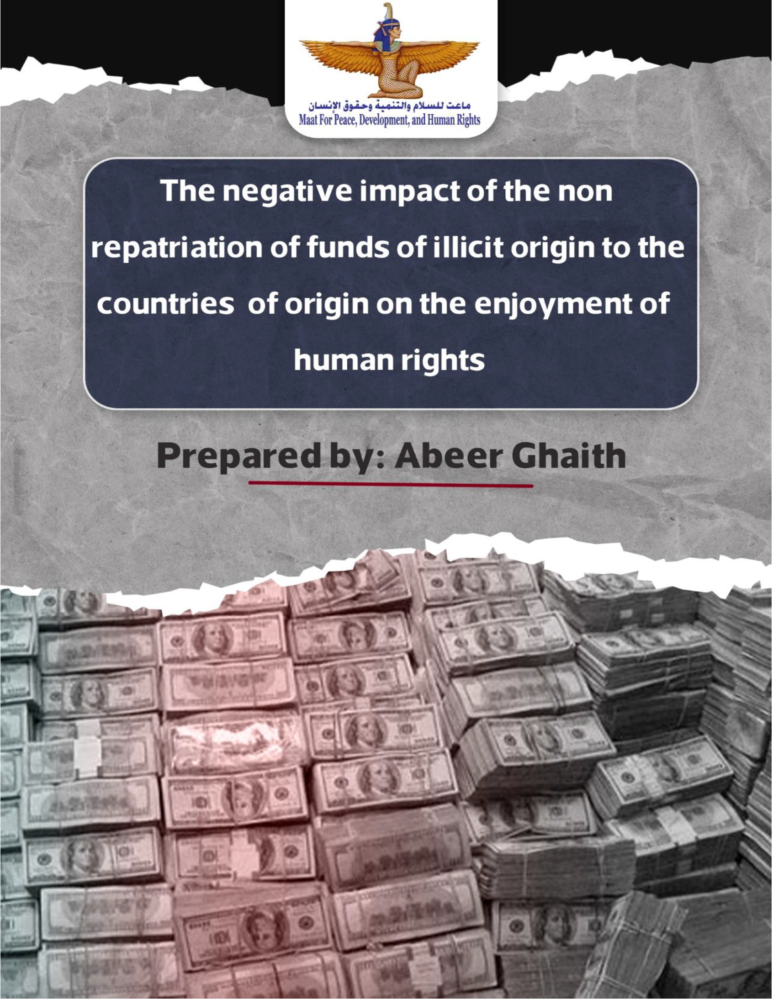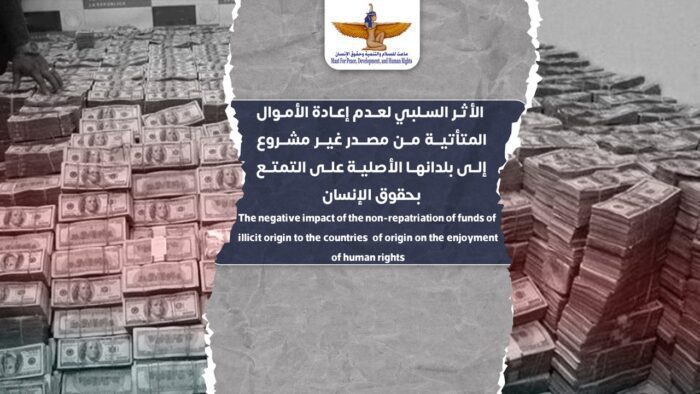Maat Calls on the United Nations to Establish an International Court to Recover Stolen Assets
Okeil: We call for developing measures to involve civil society in recovering stolen assets
Abeer Ghaith: Lack of transparency and accountability facilitate the misappropriation of public assets
Maat for Peace, Development and Human Rights participated in the Human Rights Council’s Intersessional seminar, entitled "Funds of Illicit Origin", with an oral intervention on the negative impact of the non-repatriation of funds of illicit origin to the countries of origin on the enjoyment of human rights in accordance with Council resolution 46/11, in an attempt to express its view of the international framework for the asset recovery and the challenges facing countries, as well as some efforts and initiatives that have been adopted for the return of stolen asset.
The intervention highlighted the challenges faced by countries, especially developing ones, to recover their stolen assets, stressing the need to develop financial and accounting systems in order to raise levels of transparency and accountability. Maat also called for the establishment of an international court to recover the stolen assets, as the crimes of corruption, looting of public money and illegitimate gains are imprescriptible.
On the sidelines of its participation in the seminar, Maat issued a report entitled “The Negative Impact of the Non-Repatriation of Funds of Illicit Origin to the Countries of Origin on the Enjoyment of Human Rights.” The report addressed the grave risks resulting from corruption as a serious crime undermining the rule of law, impeding development and spreading poverty and ignorance. Crimes of corruption and appropriation of public money cause irreparable damage to the economy of countries due to the loss of stolen assets. Therefore, the recovery of these assets would constitute reparation for this damage.
The report also showed the international framework for the return of stolen assets, and the impact thereof on human rights, as the return of stolen assets stashed abroad contributes to a relative treatment of the crises faced by some Arab countries, such as containing the growing calls for resolving development crises.
In this context, Ayman Okeil, the human rights expert and president of Maat, stressed that failure to return funds from illegal sources deprives countries of the resources necessary to implement human rights, including economic, social and cultural rights, especially the right to development, which threatens stability and sustainable development of countries and undermines the values of democracy and the rule of law.
Okeil stressed the need for effective cooperation and the strong will of states to ensure the right of victims and society to administratively and judicially hold the looters accountable in accordance with national and international standards and to ensure the issuance of legislation that prevents illegal behavior of assets. Okeil also called for the need to establish controls and measures in order to involve civil society in recovering stolen assets and combating organized crime.
For her part, Abeer Ghaith, a researcher at Maat, pointed out the importance of recovering stolen assets for African and Arab countries in transition, especially in light of the adverse repercussions of the Covid-19 pandemic and its debilitating impact on the economies of developing countries. Besides, the transitional government in Sudan is in critical need for the assets stolen by the leaders of Al-Bashir’s rule over the past three decades. These funds can be collected through the efforts of the Empowerment Elimination and Anti-Corruption Committee to remove empowerment, fight corruption and recover the stolen assets during the rule of the ousted president, Omar Al-Bashir. Consequently, the political will of the Sudanese government and the steps taken towards combating money laundering will help it recover the stolen assets. Ghaith also stressed that the lack of transparency and weak accountability facilitate the misappropriation of public assets.


 |
 |
shortlink: https://maatpeace.org/en/?p=34536












